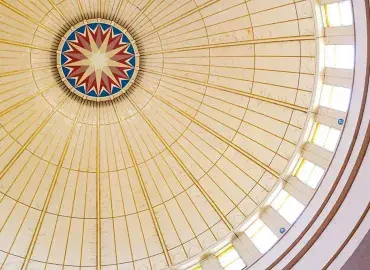
An important step in establishing interreligious dialogue towards raising the profile of the long-standing African Union Commission partnership with KAICIID was reached on Wednesday 24 January 2018, as the Citizens and Diaspora Directorate (CIDO) and the International Dialogue Centre presented their work to establish the African Union Interfaith Dialogue Forum (IFDF) jointly at the African Union Pre-Summit in Addis Ababa, Ethiopia.
Under the title “What Help is Faith?” the delegation, which included high-level representation from both partnering organizations, as well as two members of the IFDF Steering Committee, explained the rationale for the drive to include interfaith dialogue in the structure of the African Union, the progress made to establish a sustainable Forum, and what it is like to be part of the new structure.
The presentation outlined how the AU, among many other global players, recognizes and seeks to harness the powerful contributions of faith and faith actors in order to reach their goals.
According to a 2012 analysis of public opinion polls world by the Pew Research Center’s Forum on Religion & Public Life, 84% of the world’s population, or over 6 billion people, has a religious affiliation. Overall, Africa ranks as one of the two most religious regions in the world. African faith-based institutions play an active role in the education, health and charity. Any effort towards social development can be strengthened by engaging faith organizations. In a region, where ethnicity, culture and faith constitute essential elements of individual identity, effective interreligious collaboration is crucial to strengthening social cohesion and repelling violence executed in the name of religion. It can be argued that initiatives that do not address the spiritual aspects of cooperation and trust may not be taken seriously by stakeholders. Citing a Zulu proverb Eiman Kheir, Regional Policy Officer at CIDO reminded us that ‘Those that plan without the help of the spirit must plan again’.
Speaking to an audience of around 40 heads of CSOs and NGOs and representatives of Member State foreign missions, Ambassador Jalel Chelba, Head of the African Union/CIDO’s Civil Society Division, emphasized that CIDO’s constant priority is to ensure the organization is people-centred. This attitude was exemplified in the manner in which the AU developed Agenda 2063 in 2013- the fifty-year road map to achieve Africa-specific goals. Having been developed prior to the United Nations Sustainable Development goals (SDGs), it was no surprise that the Agenda 2063 is almost entirely analogous to the SDGs, with common indicators. The AU conducted wide consultations with diverse social sectors to draft the Agenda, including consultations with faith-based organizations (FBOs). In line with CIDO’s priorities, and as a means to achieve the Agenda 2063 goals, the AU-IFDF will become the mechanism to sustainably incorporate the religious actors’ and communities’ perspectives into AU policies and implementation.
KAICIID’s Deputy Secretary General Amb. Alvaro Albacete reaffirmed the Centre’s long-term dedication to this endeavor, “We are proud to be partners in this African Union initiative to enable the voices of African faith communities to inform policy making.”
Initiated in 2010, the AU-IFDF was convened anew under the AU-CIDO-KAICIID Memorandum of Understanding in November 2016. It gathered religious actors and experts from 33 African countries, who produced a Declaration of their intent to work on a wide range of pressing issues (hate speech, gender equality and countering violent extremism, among others) and elected a Steering Committee. The Steering Committee, consisting of 12 members comprising an inclusive group of religious stakeholders from each of the five African regions, who gather information on interfaith relations, coordinate initiatives and disseminate information about AU initiatives internationally. As Saydoon Sayed, CEO of Religions for Peace South Africa as well as a Steering Committee Member, representing the women’s cluster, said “Even having done it for years with RfP, it’s a challenging hat to wear”.
The Steering Committee has been industrious in their first year in office, twice gathering for three-day workshops organized by KAICIID and CIDO to compile the founding documents of the Forum and a strategy plan which will be finalized and put into action in 2018. The third African Union Interfaith Dialogue Forum is also planned for the fourth quarter of 2018, and it is hoped that it will draw even wider participation from AU Member States interested in seeing how their own interfaith institutions can become involved. “What do we want from you?” Pastor Zerihun Degu, General Secretary of the Inter-religious Council of Ethiopia and Steering Committee Member of the Eastern region, asked the AU Summit audience “Support your regional Steering Committee representative, come to the Forum and commit to the practice of interfaith dialogue to sustain lasting peace. Please spread the word.” The AU Summit audience took note.
The importance of preserving religious and cultural sites throughout Africa while countering hate speech and fostering…

